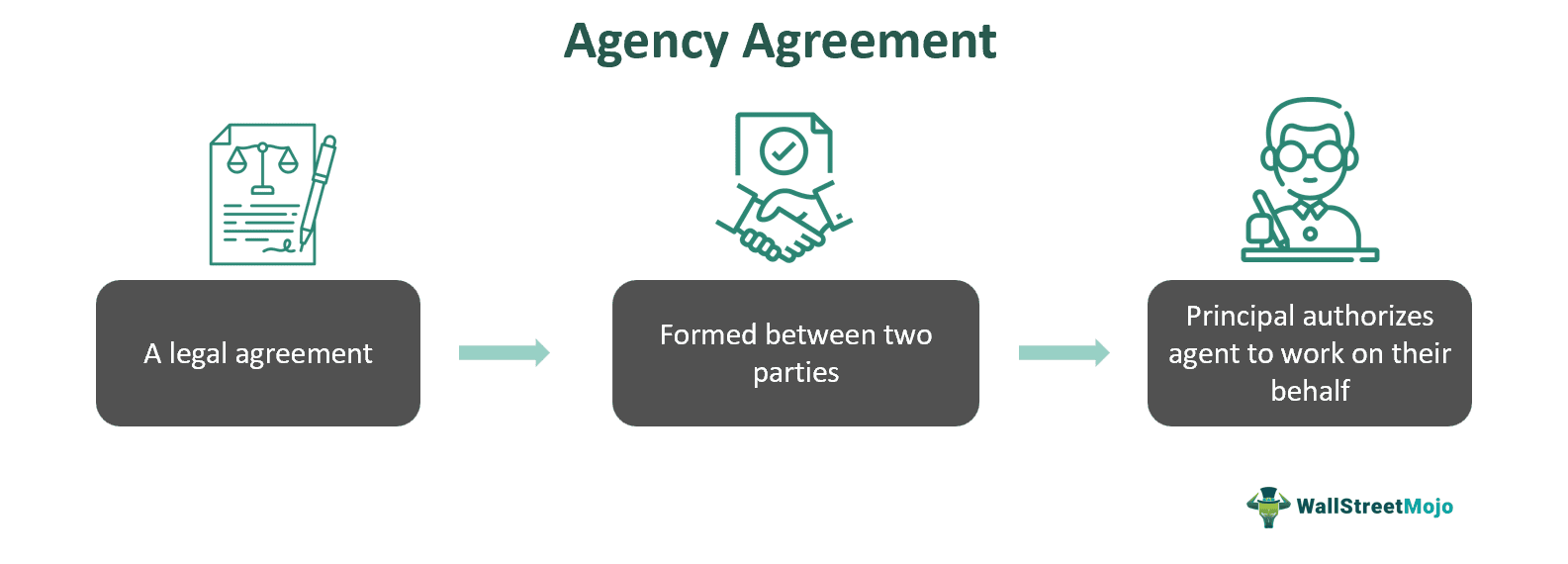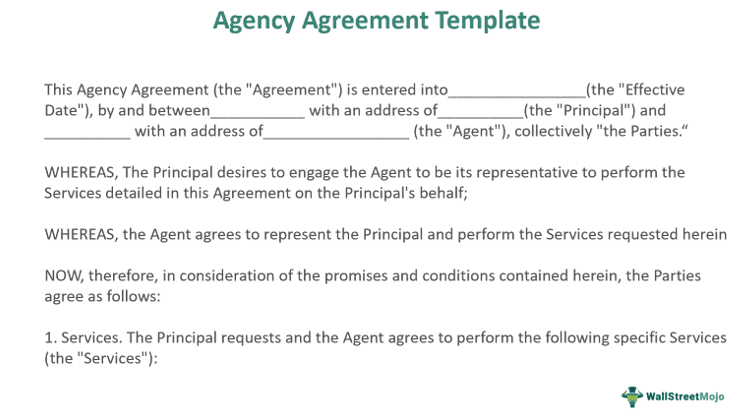Table of Contents
What Is An Agency Agreement?
An agency agreement is a legally binding contract between two parties. It is formed when one individual, who is the principal, authorizes another individual or the agent to take action on the principal's behalf. The principal who delegates the agency or responsibility to a representative establishes a legally enforceable relationship with the agent.

These agreements are created when an individual approaches a supplier, an accountant, an attorney, or another outside party to run a business on their behalf. The agreements can be implemented in various scenarios, including restricted-employment contracts, purchases and sales of real estate, and transactions involving the sale of goods.
Key Takeaways
- Agency agreements are legally binding contracts that constitute a fiduciary connection involving a principal and an agent.
- These contracts are utilized when an individual authorizes another to manage a business on their behalf.
- The authorizing individual is identified as the principal, while the individual who is executing the task is referred to as the agent.
- A representative obtains authority to carry out designated operations or actions on behalf of the principal, commonly with the expectation of a reward or remuneration.
- These contractual arrangements allow individuals to permit a trained professional to function on their behalf.
How Does An Agency Agreement Work?
Agency agreements are legally enforceable arrangements that form a fiduciary relationship between a principal and an agent. The agreement binds the principal to any commitments established by the agent and authorizes the representative to make decisions on behalf of the principal. These agreements are employed when one party authorizes another to operate a business on their behalf.
The authorizing entity is referred to as the principal, whereas the party performing the work is known as the agent. The agent is granted permission to execute specific duties or take actions on behalf of the principal, usually in return for an incentive or compensation. It is crucial for both parties to carefully consider every legal requirement of the intended arrangement prior to entering into this significant agreement.
Types
The types of agency agreements are:
- Exclusive Agency Agreements: This contract between the agent and the principal establishes that no other agents will be placed within the region allotted to the exclusive agent, and it also prohibits selling directly from vendors.
- Sole Agreements: This agreement provides the agent exclusive authority to promote and sell the supplier's products within a specific region while allowing for direct interaction between the supplier and their representative.
- Non-Exclusive Agreements: A non-exclusive agreement grants the principal business owner non-exclusive rights to employ representatives in the same industry or territory and sell products and services directly. This type of contract allows the supplier to employ numerous representatives in their area, which enables them to expand their customer base as a result.
How To Create?
The steps to create an agency agreement contract include the following:
- The names and addresses of the client and agency are usually highlighted in the initial few lines of the contract. Individuals must include such information at the beginning of the agreement so that anybody reading it is able to recognize the parties involved.
- The duration of the task is a significant component of any contract. The agreement must include the start and end dates. It should include an estimated time of completion and a clear indication of when they can collect payment from the customer after the task is completed.
- The scope of work is a crucial element in the agency contract that requires extensive coverage. It must include all anticipated results, deliverables, payment objectives, and a projected time frame for everything.
- Individuals must ensure that they include an explicit payment plan along with the total amount due from the client. They must specify the payment methods and establish if refunds are available.
- They must explain the consequences if payments are late. A specific timeframe must be provided indicating when payments are due after the invoice has been issued.
- The contract must include a termination clause. When individuals decide to part ways with the client, they must be equipped with appropriate legal understanding regarding what might happen.
Template
The agency agreement template is as follows:

Examples
Let us study the following examples to understand an agency agreement:
Example #1
Suppose Jake owns a small business and runs a local departmental store. Once his business started expanding, he needed help to maintain the accounting records in the departmental store. As a result, he hired Amy as the store's accountant. They signed an agreement according to which Jake, the principal in the contract, permitted Amy, the agent, to take action on his behalf. In return, Amy would receive a specified compensation for her services. This is an example of agency agreement.
Example #2
ESAF Small Finance Bank and Care Health Insurance made a significant leap forward by signing a Corporate Agency Agreement. The agreement aimed to expand the range of financial services available to consumers. The partnership brought together two organizations that are devoted to client satisfaction while fostering an atmosphere appropriate for growth. Through this arrangement, ESAF Small Finance Bank can provide Care Health Insurance's specialized and revolutionary Health Insurance offerings to its broad client base. The solutions are designed for both the individual and group sections of ESAF Small Finance Bank's customers.
How To Terminate?
In case of an agency agreement contract termination, a commercial agreement is not subject to any particular notice period obligations under the state contract law. However, there may be exceptions to specific statutory exclusions. It is a standard procedure in the United States for commercial agency contracts to state that the contract may be dissolved by any of the parties, at its discretion, with a specific prior notice, which usually spans thirty days. When the agreement's duration is indefinite, a party may terminate it by providing sufficient notice in advance, which is often between thirty and sixty days in advance. A party must assess whether the term is appropriate by taking into account several factors, including the type of business involved and the relationships between the parties. They must also consider if the agreement qualifies as a business venture, franchise, or dealership arrangement.
Best Practices
Some best practices for an agency agreement are:
- Individuals may seek guidance from legal representatives on how to emphasize each party's legal obligations in the contract. They may also create industry-specific provisions that offer additional security.
- The individuals must always outline a defined scope of work to steer clear of receiving extra responsibilities from clients without being compensated for them.
- They must establish payment schedules in the agency contract to ensure the clients can pay or make timely payments.
- It is necessary to include clear disclosure measures in the agreement. It enables the agency to avoid spending additional resources and time in the case of a violation of the contract.
- While the agreements must be stringent when with regard to significant components, such as the extent of the work and implications, it will be beneficial to add some leeway for supporting terms.
Importance
An agency agreement can offer several advantages to the principal, especially if the principal runs a small business. Only a few individuals possess all of the specialized expertise required to run a business. So hiring an experienced professional to act on their behalf as an agent saves the business valuable time and allows it to operate the company more efficiently. Apart from the ease of having someone function on their behalf, this type of agreement can be formed based on specific needs. These agreements enable individuals to let a skilled individual act on their behalf.

